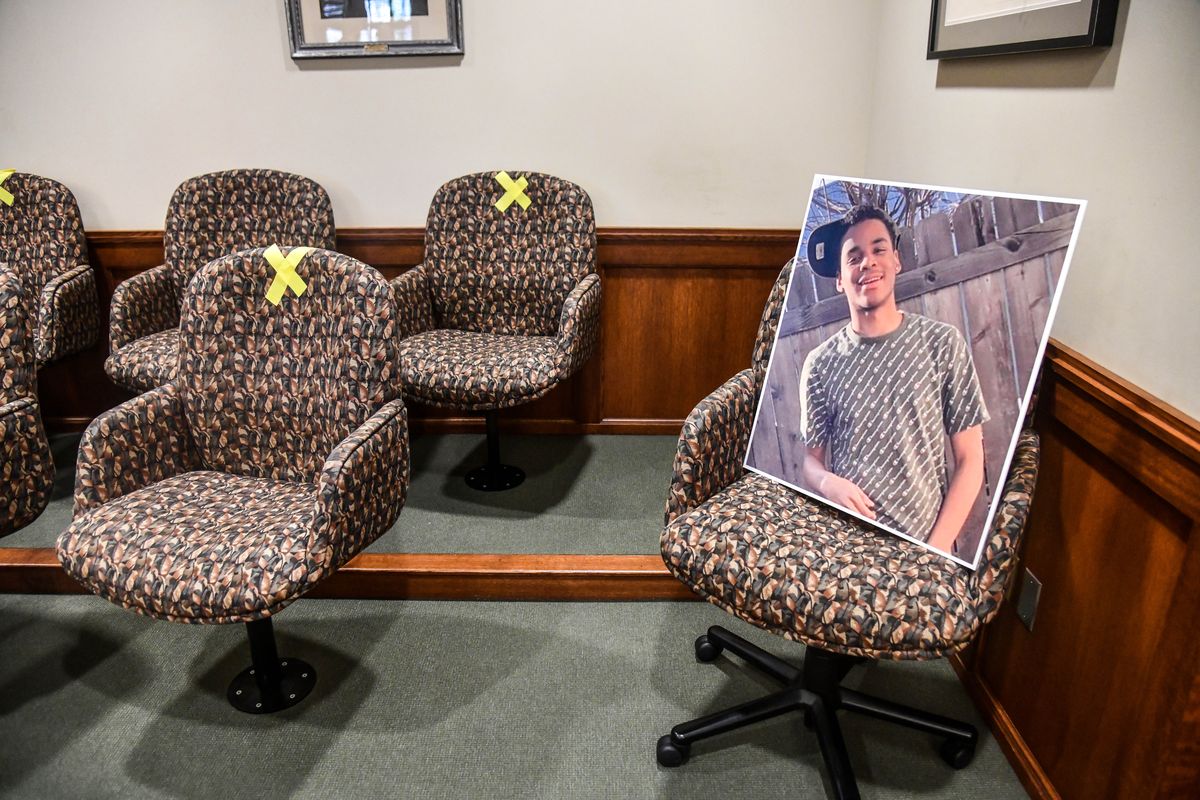Teen sentenced to more than 16 years for fatal shooting that ‘kick-started a plague of young men in Spokane killing each other’

The teen who pulled the trigger in a drive-by shooting that killed 15-year-old Norvell Amos last fall and ignited a “plague” of gang violence in Spokane was sentenced to more than 16 years in prison, Friday.
It was a somber and tearful morning in Judge Michael Price’s courtroom in the Spokane County Superior Courthouse as VaShaughn Eirls, 17, was sentenced to more than 16 years in prison.
Eirls shot Amos in the head last October in front of Amos’ mother’s house, at 3104 E. Fifth Ave., after months of what Price described as relentless harassment of Amos and his family by members of the Swavii Crips gang. Amos’ 5-year-old nephew witnessed the shooting, with his mother and young niece just inside.
Police arrested Eirls, who was 16 at the time, shortly after. He was charged with murder as an adult, to which he pleaded guilty in March. His co-defendant, alleged gang member Elijah Davis, 20, is awaiting trial after his arrest for supposedly being the driver and mastermind of the shooting.
Price called the shooting an “extraordinarily thoughtless act of gratuitous violence” that “kick-started a plague of young men in Spokane killing each other.”
Police responded to three times as many shootings in the first two months of 2021 compared to previous years. In April, Amos’ brother Kash, 19, was shot and killed in a NorthTown Mall drive-by that police tied to a feud between two gangs, per court documents.
On Friday, Amos’ family tearfully filed into the courtroom wearing clothing emblazoned with Amos’ face, birthdate and day he died.
“He was everything to me,” said Diamond McNack, Amos’ older sister.

McNack said her mother, Kathryn, raised all of her children by herself. Despite the struggles, the family was close, she said. Amos had told his family that gang members were harassing him and his 13-year-old brother in hopes of intimidating him into joining the gang, according to court records.
“They shot up my mom’s house more than one time,” McNack said, punctuated with sobs. “My son was right there. My son saw Norvell get murdered.”
After Amos’ death, McNack said gang members threatened to kill her and her children, along with her mother.
“What did Norvell do to y’all for y’all to do that to him,” McNack said. “I just don’t understand. I will never understand.”
Amos’ oldest sister, Srameshia Pursley, said he was “smart, funny and had the most beautiful smile.”
She then addressed the gang that had been harassing the family.
“Your gang tormented my mother and my 5-year-old nephew,” Pursley said. “I’ve never seen such evil kids in my life.”
Prosecutor Preston McCollam asked the court to sentence Eirls to 171½ months in prison, the middle of the standard sentencing range for second-degree murder of 123 to 220 months.
“The offense here … it’s an act of gratuitous violence,” McCollam said. “Although he’s the shooter in this case, the state does not believe he is the most culpable party.”
The prosecutor argued that Davis, who was an adult at the time of the shooting, was the mastermind and pressured Eirls into the shooting.
Eirls’ defense attorney, Jared Ausserer, argued he should get a sentence far below the normal range at 73½ months, which would allow Eirls to be released from prison before his transfer from a juvenile facility to an adult facility.
Due to Eirls’ age, Ausserer argued his youthfulness should be taken into account as a mitigating factor. The attorney mentioned the influence of older peers, substance abuse, an unstable home life and a lack of understanding of consequences as factors to be taken into consideration.
“You can see that the science and the courts have determined that the youthfulness was paramount,” he said, citing the Miller v. Alabama Supreme Court decision that made mandatory life-without-parole sentences illegal for children 17 or younger convicted of homicide.
He also cited the fact that Eirls pleaded guilty, has taken responsibility for his actions and has been well behaved in jail while awaiting trial, as signs he wants to be rehabilitated.
The defense attorney submitted a substantial information packet to the court before the sentencing, outlining Eirls unstable home life and early exposure to drugs. Eirls had been spending time in Spokane with his deceased father’s family while he was in the process of getting his GED, according to the packet.
Unbeknownst to his grandmother, who helped raise Eirls, family members were involved in gang activity and provided the young boy with drugs, according to the document.
Despite the mitigating factors, Amos’ family asked for the maximum sentence.
“He tore this family apart,” said Aunt Charlotte Lane.
When it was his turn to speak, Eirls told the court he regrets his actions.
“There was no point to it,” he said. “All it did was cause hurt and anger.”
He went on to apologize.
“I am sorry for my actions and I do apologize. I know that doesn’t mean much,” Eirls said. “I wish I could take it back.”
He then addressed the ongoing feud between the Swavii and Fifth Street gangs that has left multiple teens dead and injured over the last year.
“Both sides, I just want it to stop,” Eirls said.
After a short adjournment to think over the sentence, Price spoke to the court.
“None of it makes any sense. It’s just incredibly tragic,” he told the Amos family. “I wish there was some way I could take away the pain.”
Price referenced the packet compiled by the defense saying it “almost feels like a chapter out of a textbook when it comes to youth violence.”
He then sentenced Eirls to 175.7 months in prison with a 24-month enhancement for committing the crime with a deadly weapon, following the prosecutor’s recommendation. If Eirls serves his entire sentence, he will be in his mid-30s when released.